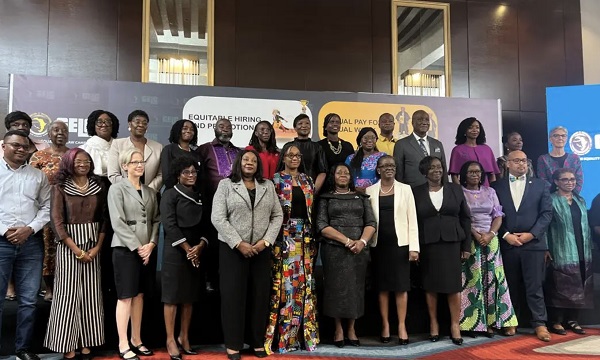Chief Justice Gertrude Sackey Torkornoo has urged female leaders to transform workplaces to better accommodate the varying needs of both genders.
She emphasized that robust resilience measures should be devised to enable the presence of women in the legal profession and the judicial system to ensure that they give their best efforts.
The Chief Justice made the call when she opened the Gender Equality in Law Campaign (GELC) in Accra on Friday.
The campaign aims to increase public awareness of the obstacles that women encounter when pursuing careers in law.
It makes use of stakeholder engagement, evidence-based research, and public advocacy and generates reforms for equitable and gender-inclusive institutional practices and policies that promote women’s leadership and professional advancement.
Research conducted by the Institute of African Women in Law (IWAL) on women in law and leadership in four African countries including Nigeria, Kenyan and South Africa, revealed that women face numerous challenges such as sexual harassment, gender stereotypes and biases, equitable hiring and promotion, equal pay for equal work.
Chief Justice Torkornoo observed that due to their gender, women in leadership and the legal profession still encounter needless and daunting challenges.
According to her, gender prejudice and unfavorable methods of social and professional competitiveness frequently make women shy away from pursuing their goals.
“Negative comments and stereotypes could take a toll on mental health and self-esteem.”
The Chief Justice said that a persistent campaign was necessary to achieve gender parity and fairness in the workplace, and that in order to create a stronger, healthier, and more advantageous legal and judicial sector, women’s integration in the workplace must be encouraged and supported.
“With evidence realized, stakeholder engagement and public advocacy to ignite needed policy reforms are also tools required for compelling needed change,” she said.
Justice Torkornoo said the campaign should not be perceived as one that sought to bolster the needs of the female gender, adding “it is one that can only assist to strengthen the pillars of justice and rule of law.”
Regarding the role of women in the administration of law and justice, she claimed Ghana appears to be moving toward “a no holds barred journey.”
“There is a significant increasing representation of women in Ghana’s judiciary. The past four years have seen a very definite shift in the number of judges/ Magistrates in the judiciary,” she said.
Chief Justice Torkornoo noted that there were 138 women serving as judges as of 2019, but by the 2022 and 2023 legal years, that number had risen by more than 100.
“In that year, the judiciary recorded a total of 218 females signifying an increase of approximately 58 per cent in the number of women who joined the four-year period…. Ghana’s judiciary is fast and s and strongly getting feminized and more women are driving the administration of justice.”
Chief Justice Torkornoo emphasized the importance of recognizing women’s contributions to the development of society, the economy, and the nation at large.
Mrs. Shiela Minkah- Premo, President of the Ghana Bar Association (GBA) Women’s Foru
Mrs. Minkah-Premo said that reports had indicated that discrimination against women in the workplace occurred for a variety of reasons, including gender bias and stereotypes, unequal pay, discrimination related to pregnancy, unfair hiring and promotion, and sexual harassment.
She called on law firms and the Ghana Bar Association to set up procedures to deal with sexual harassment and other related issues.
Law firms should also adopt and implement IWAL’s Gender Equality Policy model.
Ms. Elizabeth Adu, IWAL board member, called for partnership to make sure the campaign had an impact on all.
“everyone should have equal opportunity to grown and lead. An equal-opportunity legal profession is necessary for advancing access to justice for all.”
IWAL, a Pan-African non-profit organization is a focal point for addressing issues across the legal and judicial profession.
It is committed to supporting the formidable works of women in law across Africa and the African Diaspora.
The GELC among others, seeks to use evidence-based research to raise awareness about the institutional and structural challenges faced by women in the legal profession.
GNA





